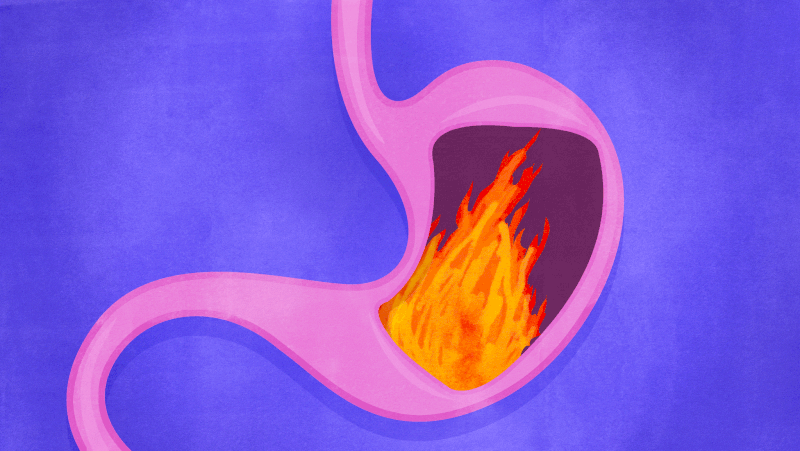Why do I get acid reflux?
Do you ever get a burning sensation in your throat or chest? If you do, it’s likely that you are suffering from acid reflux. People may also refer to acid reflux as ‘heartburn’ or ‘indigestion’.

So what is acid reflux? Well, in our stomach, there is a very strong acid. This acid is important for killing bad bacteria and for helping us to break down our food as a part of digestion. The stomach has a special lining to prevent this acid from damaging the walls of the stomach. However, if the acid happens to leave the stomach and move up the oesophagus (US: esophagus) then we may feel the acid burning in our throat or chest.
What are the symptoms of acid reflux?
There are a number of symptoms that people experience. For example, some people get a burning in their throat or chest, other get quite bad chest pains. Acid reflux can even wake us up in the night. In fact, a lot of sufferers find the symptoms of acid reflux worse when they lay down. Some people also experience nausea or a bitter taste in their mouth due to acid reflux
What are the causes of acid reflux?
There are many causes of acid reflux and so this list is not exhaustive, but here are a few of the most common causes.
Overindulgence – eating too much or food that is too rich in fat or sugar can cause acid reflux.
Poor eating habits – eating too large an amount, eating large bites without sufficient chewing, Eating too quickly, swallowing air while eating, eating too late at night. Find out more, here.
Too many antacids – taking too many antacids can make acid reflux even worse by over neutralizing stomach acid
Upset stomach – stomach bugs or eating something that doesn’t agree with us can cause reflux
Overproduction of acid – The overproduction of acid can mean that it travels up the oesophagus
Gastritis – inflammation of the stomach can mean that it produces excess acid or travels up the
Hiatus hernia – this may prevent food passing properly and can make it more difficult for acid to stay down in the stomach
Diseases of the digestive system – For reasons not always understood, bowel conditions such as Diverticular Disease and inflammatory bowel diseases (IBDs) such as Crohn’s and Ulcerative colitis can be linked to acid reflux.
Gallbladder problems or removal – Dysfunction or removal of the gallbladder can cause excess bile which can lead to acid reflux. If you have severe reflux immediately after gallbladder removal, speak with the surgeon.
IBS – Irritable bowel syndrome can affect the transit of food and cause cramping which may lead to acid reflux.
Stomach/Gastric ulcer – stomach ulcers can cause excess acid production
H. Pylori infection – A overgrowth of a bacteria called H. Pylori in the stomach can lead to poor digestion and acid reflux as a result.
Antibiotics/Certain medications – Antibiotics often kill both bad and good bacteria and so a lack of good bacteria that aid digestion can cause some acid reflux, also, some other medications may affect digestion or stomach acid production
Obesity – the excess pressure on the body caused by excess weight can make acid travel up into the oesophagus, causing reflux.
Gastroparesis/Delayed gastric emptying – acid reflux can occur when food stays in the stomach for too long.
Stress/Anxiety – digestion slows down when we experience stress and anxiety, because of this, food tends to stick around in the stomach a little longer and so we can experience acid reflux.
Bariatric surgery – weight loss surgeries can increase the chance of reflux due to the tiny size of the stomach pouch. If this happens, you need to speak with your surgeon to find a solution; this may include medication or further surgery.
How can I prevent acid reflux?

Good eating habits – adopting good eating habits will help prevent reflux. This means eating small meals, taking small bites, chewing well and eating slowly. It also involves not eating late at night. You can read my post on good digestion habits to find out more.
Avoiding acidic foods – fruit juices, tomatoes, citrus fruits, alcohol, vinegar, coffee are all acidic foods that we eat. Some people can stop their reflux by simple cutting down on acidic foods or removing them from their diet.
Avoiding trigger foods – Some people are triggered by different foods, common triggers may involve nuts, cheese, carbonated drinks, etc. By using a food and symptom diary to identify trigger foods, you can cut these out of your diet.
Avoid smoking and alcohol – smoking and drinking alcohol are both thought to increase the chance of acid reflux since they are both harsh on the stomach. Smoking can also increase the chances of stomach ulcers, so if you suffer with reflux, it’s a good idea to try to quit.
Avoid taking a lot of painkillers unless told to by your doctor – taking too many painkillers can lead to stomach ulcers and excess acid production
Make sure when taking medications to follow the instructions (such as taking with food) – taking medicine on an empty stomach can be bad for the stomach, so be sure to
Avoid stressful situations – Trying our best to not get too stressed out or anxious can help prevent acid reflux.
How can I treat acid reflux?
If this is just a one-off episode of acid reflux, you can take a simple over the counter medication such as an antacid. Branded examples include Gaviscon, Pepto-Bismol, Rennie and Zantac (ranitidine). Take the lowest recommended dose and give it some time to work. This is important because if you take too much of these medicines, they can actually make the reflux worse by causing your stomach to produce even more acid.
If you are experiencing reflux regularly, have a look at if there is something specific that you are eating or doing to cause it. For example, does it only happen after a glass of wine? Or perhaps it happens after you eat tomatoes or drink coffee… The best way to investigate this is to keep a food and symptom diary, you can download a tracker from here. If you do find a trigger, consider cutting this out of your diet.

If you can’t find a specific trigger but you’re a smoker, consider quitting smoking to see if it makes a difference.
Now, if the acid reflux is happens regularly and you are unable to find relief by changing your diets or habits, then it is time to visit your doctor. Be sure to tell the doctor about any other symptoms you are experiencing, for example, abdominal pains or cramps, a change in bowel habits, nausea or vomiting, excessive belching/burping or passing gas and any disruptions to your sleep. If you have been keeping a food and symptom diary, take this along to your appointment. It will really help the doctor to understand your symptoms and provide an accurate diagnosis.
Your doctor may prescribe you a medication to take regularly in order to reduce the amount of acid your stomach produces such as ppis (proton pump inhibitors) such as Omeprazole. However, it is important to find the cause of the reflux rather than only treating the symptoms. To diagnose problems, a doctor may suggest you take a breath test for H. Pylori (a bacteria that can survive in the stomach’s acidic conditions) or undergo an endoscopy/gastroscopy where a camera inserted into the stomach. This allows a doctor to identify problems such as ulcers or inflammation. They can also take tissue biopsies during the endoscopy to test for further problems.
Why you shouldn’t ignore acid reflux…
If you get acid reflux regularly, it’s very important to not ignore it and make sure to get it treated because long-term acid reflux can cause bigger problems. For example, regular acid reflux can cause tooth decay/and tooth acid erosion. It can also cause stomach ulcers, and can even increase your risk of stomach and oesophageal (US: esophageal) cancer in the future.
Do you suffer with acid reflux? Do you have a trigger food or drink? How do you deal with it?








